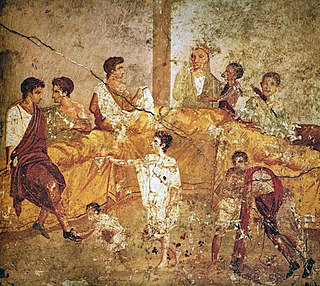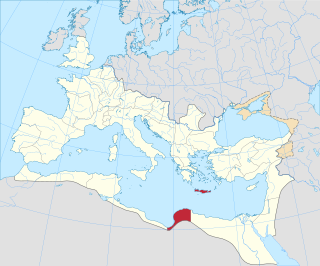Related Research Articles
Year 211 BC was a year of the pre-Julian Roman calendar. At the time it was known as the Year of the Consulship of Maximus and Maximus. The denomination 211 BC for this year has been used since the early medieval period, when the Anno Domini calendar era became the prevalent method in Europe for naming years.
Titus Pomponius Atticus was a Roman editor, banker, and patron of letters, best known for his correspondence and close friendship with prominent Roman statesman Marcus Tullius Cicero. Atticus was from a wealthy Roman family of the equestrian class and from the Pomponia gens.
Attica was the daughter of Cicero's Epicurean friend Titus Pomponius Atticus. She was also the first wife of Marcus Vipsanius Agrippa, close friend of the emperor Augustus.
Pomponia is the female name for the Pomponia gens of Ancient Rome. This family was one of the oldest families in Rome. Various women bearing this name lived during the Middle and Late Roman Republic and the Roman Empire. The oldest known Pomponia was mother of a famous Roman general; the second and third were related to each other. The relationship between these women, if any, is not known. They descended from Pomponius, the first son of Numa Pompilius, the second King of Rome.
Lucius Pomponius was a Roman dramatist. Called Bononiensis (“native of Bononia”, Pomponius was a writer of Atellanae Fabulae, and a near contemporary of Quintus Novius. Pomponius was the first to give artistic dignity to the Atellan Fables by making them less improvised and providing the actors with a script and a predetermined plot. Pomponius’ skill in the utilization of rustic, obscene, quotidian, alliterative, punning, and farcical language was remarked on by Macrobius in his Saturnalia, as well as by Seneca and Marcus Velleius Paterculus. His work included political, religious, social, and mythological satires.

Annia Aurelia Faustina was an Anatolian Roman noblewoman. She was briefly married to the Roman emperor Elagabalus in 221 and thus a Roman empress. She was Elagabalus' third wife.
Quintus Pleminius was a propraetor in 205 BC. He was given command over Locri in Bruttium by Scipio Africanus after its recapture, considered the "outstanding event" in Sicilian operations that year. His governorship, if it should be called that, ended in sacrilege and murder.

Vistilia was a Roman matron of the gens Vistilia known by her contemporaries for having seven children by six different husbands; Pliny the Elder was more impressed by the fact most of her pregnancies were remarkably brief. Five of her sons became consuls, her daughter Milonia Caesonia became Roman empress through her marriage to Caligula, and her granddaughter Domitia Longina became empress through her marriage with Domitian. Due to her fertility Vistilia became a byword for prodigious fecundity in antiquity.
Publius Furius Philus was a consul in 223 BC, a praetor in 216, and a censor in 214. He died the following year, before resigning his office.
Manius Pomponius Matho was a Roman general who was elected consul for the year 233 BC with Quintus Fabius Maximus Verrucosus. He was also the maternal grandfather of the general and statesman Scipio Africanus.
Titus Pomponius was a member of the Gens Pomponia and a direct descendant in male line of Pomponius, the first son of Numa Pompilius, the second King of Rome, and came from an old but not strictly noble Roman family of the equestrian class. He was the owner of an excellent library in his house at the Appian Way, lord of a great fortune, partner of many companies of publicans and of important companies of fishing and conserves in Gades, in Hispania, and of great properties in Illyricum.

Crete and Cyrenaica was a senatorial province of the Roman Republic and later the Roman Empire, established in 67 BC, which included the island of Crete and the region of Cyrenaica in modern-day Libya. These areas were settled by Greek colonists from the eighth to sixth centuries BC. After Alexander the Great's death, his short-lived empire was partitioned between his generals during the Wars of the Diadochi. Cyrenaica ended up under Egyptian rule, except for Crete, which remained independent.

The gens Caecilia was a plebeian family at ancient Rome. Members of this gens are mentioned in history as early as the fifth century BC, but the first of the Caecilii who obtained the consulship was Lucius Caecilius Metellus Denter, in 284 BC. The Caecilii Metelli were one of the most powerful families of the late Republic, from the decades before the First Punic War down to the time of Augustus.

The gens Pomponia was a plebeian family at ancient Rome. Its members appear throughout the history of the Roman Republic, and into imperial times. The first of the gens to achieve prominence was Marcus Pomponius, tribune of the plebs in 449 BC; the first who obtained the consulship was Manius Pomponius Matho in 233 BC.

Quintus Catius was an officer (legatus) of the Roman Republic during the Second Punic War.

Mathos was a Libyan from the North African possessions of Carthage and was recruited into the Carthaginian Army during the First Punic War at some point prior to 241 BC. Mathos's date of birth is unknown, as are most details of his activities prior to his coming to prominence as a low-ranking officer in 241 BC.
Marcus Aemilius Barbula was a Roman politician from the gens Aemilia. He was a consul in 230 BC alongside Marcus Junius Pera, succeeding Marcus Pomponius Matho and Gaius Papirius Maso and preceding Lucius Postumius Albinus and Gnaeus Fulvius Centumalus. He was son of Lucius Aemilius Barbula and grandson of Quintus Aemilius Barbula, also consuls, and the third and last of the lineage in this charge.
Gaius Papirius Maso was a Roman politician in the third century BC.